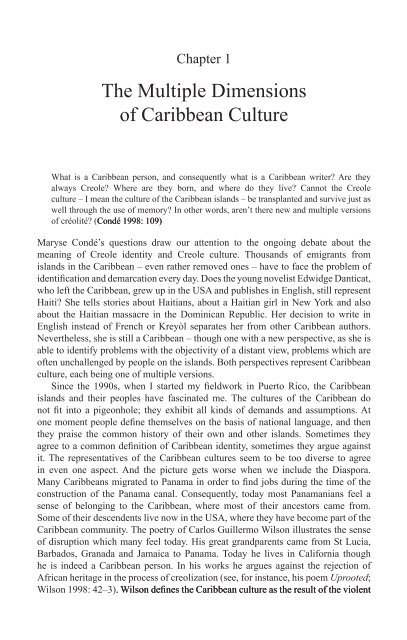You also want an ePaper? Increase the reach of your titles
YUMPU automatically turns print PDFs into web optimized ePapers that Google loves.
Chapter 1<br />
The Multiple Dimensions<br />
<strong>of</strong> <strong>Caribbean</strong> Culture<br />
What is a <strong>Caribbean</strong> person, and consequently what is a <strong>Caribbean</strong> writer? Are <strong>the</strong>y<br />
always Creole? Where are <strong>the</strong>y born, and where do <strong>the</strong>y live? Cannot <strong>the</strong> Creole<br />
culture – I mean <strong>the</strong> culture <strong>of</strong> <strong>the</strong> <strong>Caribbean</strong> islands – be transplanted and survive just as<br />
well through <strong>the</strong> use <strong>of</strong> memory? In o<strong>the</strong>r words, aren’t <strong>the</strong>re new and multiple versions<br />
<strong>of</strong> créolité? (Condé 1998: 109)<br />
Maryse Condé’s questions draw our attention to <strong>the</strong> ongo<strong>in</strong>g debate about <strong>the</strong><br />
mean<strong>in</strong>g <strong>of</strong> Creole identity and Creole culture. Thousands <strong>of</strong> emigrants from<br />
islands <strong>in</strong> <strong>the</strong> <strong>Caribbean</strong> – even ra<strong>the</strong>r removed ones – have to face <strong>the</strong> problem <strong>of</strong><br />
identification and demarcation every day. Does <strong>the</strong> young novelist Edwidge Danticat,<br />
who left <strong>the</strong> <strong>Caribbean</strong>, grew up <strong>in</strong> <strong>the</strong> <strong>USA</strong> and publishes <strong>in</strong> English, still represent<br />
Haiti? She tells stories about Haitians, about a Haitian girl <strong>in</strong> <strong>New</strong> <strong>York</strong> and also<br />
about <strong>the</strong> Haitian massacre <strong>in</strong> <strong>the</strong> Dom<strong>in</strong>ican Republic. Her decision to write <strong>in</strong><br />
English <strong>in</strong>stead <strong>of</strong> French or Kreyòl separates her from o<strong>the</strong>r <strong>Caribbean</strong> authors.<br />
Never<strong>the</strong>less, she is still a <strong>Caribbean</strong> – though one with a new perspective, as she is<br />
able to identify problems with <strong>the</strong> objectivity <strong>of</strong> a distant view, problems which are<br />
<strong>of</strong>ten unchallenged by people on <strong>the</strong> islands. Both perspectives represent <strong>Caribbean</strong><br />
culture, each be<strong>in</strong>g one <strong>of</strong> multiple versions.<br />
S<strong>in</strong>ce <strong>the</strong> 1990s, when I started my fieldwork <strong>in</strong> Puerto Rico, <strong>the</strong> <strong>Caribbean</strong><br />
islands and <strong>the</strong>ir peoples have fasc<strong>in</strong>ated me. The cultures <strong>of</strong> <strong>the</strong> <strong>Caribbean</strong> do<br />
not fit <strong>in</strong>to a pigeonhole; <strong>the</strong>y exhibit all k<strong>in</strong>ds <strong>of</strong> demands and assumptions. At<br />
one moment people def<strong>in</strong>e <strong>the</strong>mselves on <strong>the</strong> basis <strong>of</strong> national language, and <strong>the</strong>n<br />
<strong>the</strong>y praise <strong>the</strong> common history <strong>of</strong> <strong>the</strong>ir own and o<strong>the</strong>r islands. Sometimes <strong>the</strong>y<br />
agree to a common def<strong>in</strong>ition <strong>of</strong> <strong>Caribbean</strong> identity, sometimes <strong>the</strong>y argue aga<strong>in</strong>st<br />
it. The representatives <strong>of</strong> <strong>the</strong> <strong>Caribbean</strong> cultures seem to be too diverse to agree<br />
<strong>in</strong> even one aspect. And <strong>the</strong> picture gets worse when we <strong>in</strong>clude <strong>the</strong> <strong>Diaspora</strong>.<br />
Many <strong>Caribbean</strong>s migrated to Panama <strong>in</strong> order to f<strong>in</strong>d jobs dur<strong>in</strong>g <strong>the</strong> time <strong>of</strong> <strong>the</strong><br />
construction <strong>of</strong> <strong>the</strong> Panama canal. Consequently, today most Panamanians feel a<br />
sense <strong>of</strong> belong<strong>in</strong>g to <strong>the</strong> <strong>Caribbean</strong>, where most <strong>of</strong> <strong>the</strong>ir ancestors came from.<br />
Some <strong>of</strong> <strong>the</strong>ir descendents live now <strong>in</strong> <strong>the</strong> <strong>USA</strong>, where <strong>the</strong>y have become part <strong>of</strong> <strong>the</strong><br />
<strong>Caribbean</strong> community. The poetry <strong>of</strong> Carlos Guillermo Wilson illustrates <strong>the</strong> sense<br />
<strong>of</strong> disruption which many feel today. His great grandparents came from St Lucia,<br />
Barbados, Granada and Jamaica to Panama. Today he lives <strong>in</strong> California though<br />
he is <strong>in</strong>deed a <strong>Caribbean</strong> person. In his works he argues aga<strong>in</strong>st <strong>the</strong> rejection <strong>of</strong><br />
African heritage <strong>in</strong> <strong>the</strong> process <strong>of</strong> creolization (see, for <strong>in</strong>stance, his poem Uprooted;<br />
Wilson 1998: 42–3). Wilson def<strong>in</strong>es <strong>the</strong> <strong>Caribbean</strong> culture as <strong>the</strong> result <strong>of</strong> <strong>the</strong> violent


















